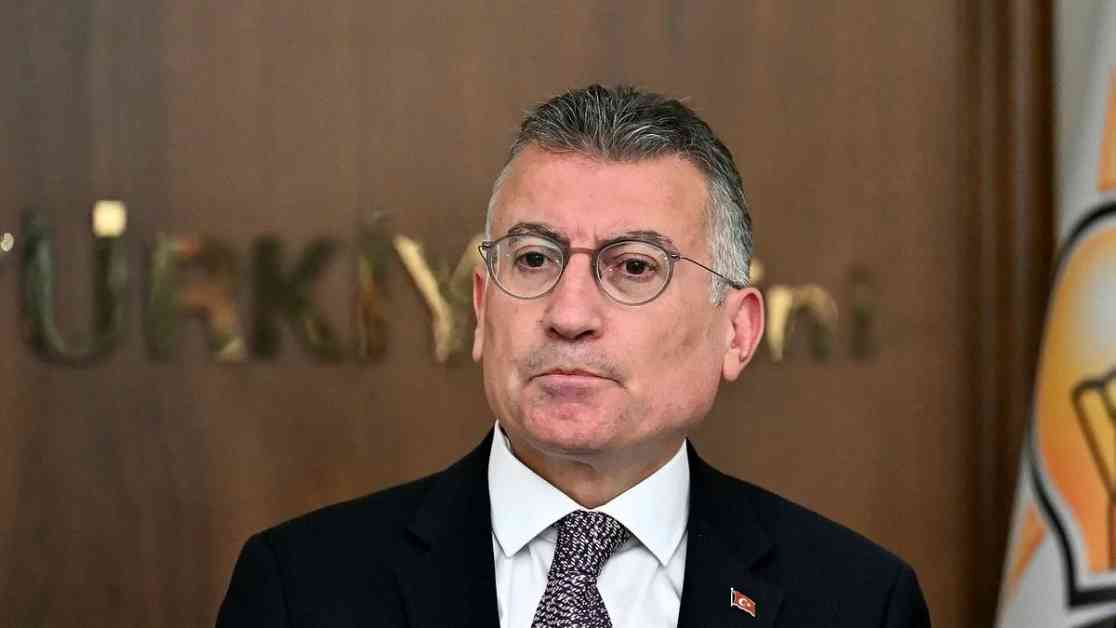AK Party’s Güler Explains New Regulations: Stricter Penalties for Unlicensed Weapons and Limiting Emergency Light Usage
A proposed bill, carrying the signatures of AK Party deputies, was presented to the Presidency of the Turkish Grand National Assembly, aiming to amend the Law on Civil Servants and Some Laws, as well as Law No. 375.
AK Party Group Chairman Abdullah Güler elaborated on the details of the proposal submitted to the Presidency of the Turkish Grand National Assembly. Güler’s statements highlighted key aspects of the proposed changes:
Increasing Penalties for Unlicensed Weapons:
“In light of the recent increase in the use of unlicensed firearms in violent incidents in our country, we are enhancing the penalties for those who possess unlicensed weapons to effectively combat crimes and prevent their commission. We believe that this regulation will make a significant contribution. Additionally, we are proposing amendments to impose heavier penalties on those who convert blank firearms into firearms capable of causing death.”
Preventing the Use of Emergency Lights:
“It is crucial to prevent the misuse of emergency lights. In this regard, we are intensifying fines for traffic violations in the Highway Code to enhance traffic order. We are setting the fine at 96,000 TL, increasing to 196,000 TL in case of repeated offenses. Furthermore, we are introducing measures for the confiscation of vehicles and temporary suspension from traffic. The bill also includes provisions for facilitating the exit of foreigners who contribute to security in combating irregular migration. We propose expedited resolution of cases against deportation orders to promptly remove irregular migrants from the country.”
Second Retirement for Police Officers:
“We are proposing the establishment of a Police Assistance Fund for law enforcement personnel, offering retirement, death, and disability benefits similar to the OYAK system as an optional participation scheme after retirement. From revising the entry requirements for the position of district governor to regulating the working conditions of watchmen, we have included a range of regulations to address emerging needs.”
The bill also includes amendments to the Law on Civil Servants to regulate the educational requirements for district governor candidates in accordance with the Constitutional Court’s annulment decision. Candidates aspiring to become district governors must have completed a four-year undergraduate degree in international relations, political science, public administration, economics, business administration, finance, econometrics, labor economics, industrial relations, or equivalent fields, with at least 80% of coursework dedicated to the specified subjects. Additionally, they must have completed postgraduate thesis-based education in international relations, political science, public administration, law, finance, or economics.
The regulations regarding the recruitment and training of district governor candidates will be outlined in a regulation issued by the Ministry of Interior. Individuals who have served as district governors for at least three years and subsequently appointed to senior public administration positions by the President or the Turkish Grand National Assembly, as well as those appointed to director or equivalent senior management positions in the Ministry of Interior and its affiliated organizations, will have their service periods counted as part of the Civil Administration Services Class.
Reforms Related to Provincial Inspectors:
Provincial inspectors serving in the Provincial Inspection Board will be appointed from among individuals who have worked in the Civil Administration Services Class for at least six years after obtaining the title of district governor. The provisions regarding the appointment to the positions of governor-provincial chief inspector will be subject to the relevant legislation.
The inspection, audit, examination, research, and investigation duties of the Provincial Inspection Board Presidency will be carried out by provincial inspectors. When requested by the inspector, all documents, registers, and information, including those classified as confidential, must be presented by public institutions and organizations subject to inspection.
Inspectors will have the authority to seal cash, documents, and assets and secure lockers, deposits, and warehouses for safekeeping. They may request assistance, information, documents, records, and files from other institutions, public benefit associations, and individuals, subject to relevant laws.
Inspectors will have access to and may examine and copy documents, computer programs, logs, and other digital materials belonging to institutions and organizations, including public systems in open areas and camera recordings in buildings and facilities.
In cases requiring expertise or technical knowledge, inspectors may request the assignment of a sufficient number of personnel from public institutions and organizations. This request must be promptly fulfilled by governors, district governors, and officials of relevant institutions and organizations.
Inspectors may prioritize the examination and determination of technical and criminal laboratory tests from technical and criminal laboratories within institutions and organizations. These requests will be fulfilled free of charge by laboratories belonging to the Ministry of Interior and its affiliated organizations.
The evaluation and assessment for the determination of first-class civil administration officers will be conducted a maximum of twice a year by the Ministry of Interior.
Those who have not been promoted to first-class civil administration status may be subject to reevaluation in the first assessment conducted after the decision date.
Emoluments of individuals appointed to general director positions or equivalent positions in the Ministry of Interior and its affiliated, related, and associated organizations, including those who have served as governors or provincial governors, will be based on the payment elements of governors.
Reforms Related to the Police Welfare and Assistance Fund:
Amendments will be made to the Police Welfare and Assistance Fund in the Law on the Police Organization. The members of the fund will consist of current members of the Police Organization who have retired while leaving their participation fees in the fund.
The fund will operate as an autonomous legal entity governed by public law in its relationships with its members while being subject to private law provisions in all other matters. Its financial and administrative operations will be autonomous, and it will have legal personality.
The fund’s revenues will come from membership fees, participation fees, investment returns on these fees, as well as donations and contributions. The membership fee will be 9% of the basic monthly pension amount or the base earnings amount for retirement. The General Assembly of the fund will have the authority to increase or decrease this rate by up to 5 percentage points.
Individuals who began their service in the Police Organization before December 28, 2018, and continue to serve in the organization will be eligible to join the fund. After three years from their entry into the fund, they will be able to withdraw their fees, including returns, and leave the fund. However, those who leave the fund will not be readmitted.
The fund will provide retirement aid, disability aid, and death aid to members of the Police Organization or their heirs in case of death, as well as participation fee dividends and death aid to retired members.
The organs of the fund, including the determination of the members of the board, elections, duties, entry into membership, fees, participation fees, withdrawal from membership, suspension of membership, deductions, contributions, participation fee dividends, fund revenues, and the operation of social services, as well as oversight, investigation, fiscal year, budget, distribution of net profit and services provided by the fund, will be regulated by a regulation issued by the President.
Inclusion of Firearm Parts in the Law:
Parts essential for firearms, such as barrels, slides, frames, cylinders, firing mechanisms, extractors, triggers, and firing pins, will be included in the scope of the Firearms and Knives and Other Tools Law concerning their importation, manufacturing, sale, purchase, transportation, or possession.
For firearms received as gifts under the provisions of the Firearms and Knives and Other Tools Law, no time limit will be imposed on the registration and documents granting individuals permission to possess or carry these firearms.
Individuals receiving firearms as gifts under the same law will be exempt from all taxes, fees, and charges related to the registration and documents authorizing possession or carrying of these firearms.
Renewal of Licenses for Stolen or Lost Firearms:
Under the amendments to the Firearms and Knives and Other Tools Law, individuals who have had their firearm stolen for the second time or lost it for the second time will be granted permission for possession or carrying of a single firearm when applying for a new weapon license. If this firearm is transferred, permission for possession or carrying may be granted for the new owner. The renewal of the license for unlost or unstolen firearms will not be considered under these provisions.
Individuals who have had their firearm stolen for the third time or lost it for the third time will have their firearm license revoked, and they will not be granted permission for possession or carrying for a period of 5 years from the date of the offense. After 5 years have passed, these individuals may apply for permission for possession or carrying of a single firearm.
In conclusion, the proposed bill put forward by the AK Party aims to strengthen regulations regarding unlicensed weapons and emergency light usage, enhance the qualifications for district governor candidates, and introduce reforms related to police welfare and assistance funds. These changes are designed to improve public safety and combat crime effectively.





















